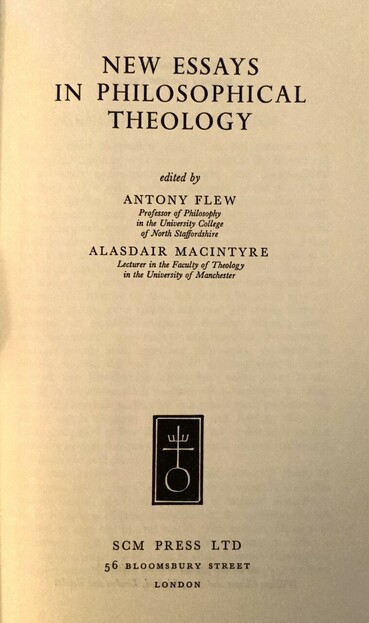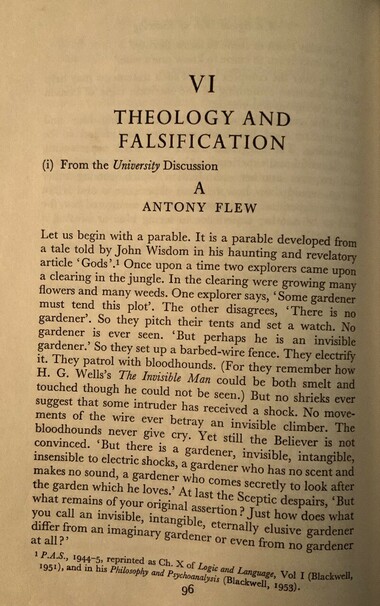Analytic philosophers saw the need for clarification in the existing ways that philosophy was done, proponents of this process included the works of Gottlob Frege, G.E. Moore, and later Bertrand Russell... #philosophy #analyticphilosophy #BertrandRussell #gottlob_frege #georgemoore #logicalpositivism #ordinarylanguagephilosophy #anwhitehead #historyofphilosophy
https://philosophyindefinitely.wordpress.com/2020/11/11/rise-of-20th-century-philosophy-analysis/
#AnalyticPhilosophy
Logical positivism continues the positivist emphasis and continues the employment of objective empirical data of a scientific sort and seeking to formulate empirical generalisations with explanatory power... #logicalpositivism #ViennaCircle #BertrandRussell #ludwigwittgenstein #historyofphilosophy #analyticphilosophy https://philosophyindefinitely.wordpress.com/2020/07/15/logical-positivism/
Something about the way the consequentializing literature (and as a result the normative ethics literature more generally) defines what makes a moral theory consequentialist always bothered me. It always felt like the definition was trying to give precision beyond what makes sense for a family of views. But of course "that's too precise of a definition" is not an objection that gets taken very seriously by analytic philosophers.
I always tried to vaguely gesture at my worry in conversation by saying things like "consequentialism isn't a theory or set of theories, its a tradition."
I don't think that's wrong, but I can understand why is always left my interlocutors unsatisfied.
I think finally reading some Elisabeth Camp has helped it click for me - I think consequentialism is a Campian *perspective* (something like a cluster of dispositions and patterns of salience in deliberation), and the consequentialist tradition is the set of people who have roughly overlapping Campian perspectives about how to approach moral theory.
I think this is also equally true of deontology and virtue theory.
On this proposal, we shouldn't think about dividing moral theories in terms of logical structure or even of how they answer some set of paradigmatic moral dilemmas (though there will be non-coincidental connections), but in terms of which things are taken to be salient and how to approach moral theory. While certain approaches will tend to lead to certain answers to these questions about structure and solutions to moral dilemmas, they don't entail them.
From Nikhil Krishnan’s A Terribly Serious Adventure: Philosophy at Oxford 1900-1960:
The big claims were about the imminence of a final dissolution: ancient knots would be cut, the old metaphysical doctrines hunted to extinction. Once the old detritus was cleared, then the revelation, ‘of a whole world of infinite subtlety and diversity with its own fine and complex structure, a world which had always lain about us to be observed as soon as we ceased straining our eyes towards imaginary grandeurs and simplicities’*. That world would reveal itself once we ceased straining our eyes and tried instead to listen, not least to ourselves.
Remind you of anyone? Now it’s been a long while since I was immersed in Rorty but I don’t recall this ever being part of his intellectual narrative, whereas the ethos of his ironism I now suspect resembles post-war Oxford philosophy much more than, as often alleged, postmodernism. To what extent was this an intellectual juncture reached through multiple pathways or a common ethos which coalesced?
*From Peter Strawon’s post-linguistic thaw
#analyticPhilosophy #irony #language #linguisticTurn #richardRorty
#Introduction:
My name is Robbie Norlyn! I’m a published author who primarily writes science fiction and fantasy for sale to the public. Anything else I have written, about a wide array of topics, is academic, private, or public domain.
I have had a wide variety of occupations over the years. I’m an #artist, #engineer, #scientist, and #technologist by way of experience and training.
My #AlmaMater is the #UniversityofWashington. Where I completed a #BA in #Philosophy. More specifically the school of #AnalyticPhilosophy with a strong focus on #science. However, I have a vast knowledge of #ethics and #theology due to my environment as a youth.
Why #Babka?
I’m #Jewish by descent (both sides, #Ashkenazi & #Sephardic) and am becoming more spiritual as I get older. I was raised in a #Secular/#CryptoJew environment. I grew up with Jewish memes & traditions without understanding any of their importance. Dreidels, Fiddler on the Roof, Passover, and Shel Silverstein are burned into my memories.
Putting aside quibbles about whether #PhilipKitcher's critique of #analyticPhilosophy is novel, I found #TimothyWilliamson's critique to be the kind of #romanticism, #anecdote, and unsupported speculation that's dissatisfying and deficient to empirically-oriented #philosophers like #Kitcher (see my #marginalia).
If I were #Kitcher, #Williamson's critique may not provoke a single qualm about my latest #book; it may only reinforce my concern about contemporary analytic #philosophy/#philosophers.
#TimothyWilliamson posted an accepted critique of fellow #philosopher #PhilipKitcher's book 𝙒𝙝𝙖𝙩'𝙨 𝙩𝙝𝙚 𝙐𝙨𝙚 𝙤𝙛 𝙋𝙝𝙞𝙡𝙤𝙨𝙤𝙥𝙝𝙮? (#Oxford #University Press)
https://drive.google.com/file/d/1BTPlCPQ5FmAGCARgbT0yC6MVU_iqirbx/view
"According to ...Kitcher,... much of contemporary #analyticPhilosophy ...offers ... nothing useful. [...] He wants #philosophy to change [...] But most of his recommendations would make philosophy worse: more anxious to imitate the neighbours and impress the general public...."
Au sujet de la publication de Discovering Reality: Feminist Perspectives on Epistemology, Metaphysics, Methodology, and Philosophy of Science. (1983), du début des science wars, et de la réception de la philo féministe par le mainstream de la profession.
Cet entretien avec Harding est vraiment une mine d'or ! ➡️ https://digital.sciencehistory.org/works/qlvzx3b
#philosophie #épistémologie #féminisme #philosophy #feminism #harding #hintikka #analyticphilosophy #sciencewars #oralhistory
My article, “Gettier Unscathed for Now,” has been #published in Logos & Episteme. I demonstrate that Mizrahi’s anti #Gettier argument essentially proves the veracity of Gettier cases.
https://doi.org/10.5840/logos-episteme202213325
#philosophy #epistemology #analyticphilosophy #peerreview #knowledge #justifiedtruebelief #semantic #kripke
Matthew's Basilisk*: Someday when Matt becomes all powerful, I will torment & torture those that didn't work towards this outcome. By the power of #AnalyticPhilosophy Class 101 #logic, you now feel compelled to make me into an all powerful ruler of the world.
*see Roko's basilisk
But our confidence rests not on objectivity but rather on the convictional power of the Holy Spirit.
J. K. A. Smith
This is very good! Christoph Schuringa on #radicalism, #analyticphilosophy, and #McCarthyism. A really good explanation of why working in academic philosophy can be an alienating experience even today.
https://jacobin.com/2023/01/analytic-philosophy-mccarthyism-postwar-communism
Volume 18, No. 2, 2022 Special Issue Interactions between analytic and Islamic philosophy/theology - European Journal of Analytical Philosophy
Right, #Philosophy gang: thinking about my Masters dissertation subject. I want to do something on Philosophy of Mind and the hard question of consciousness/Mary’s Room but looking at what more Continental-leaning philosophers/approaches can add to the debate. Does anyone have any recommendations along these lines? Interested particularly in Hegel and Hegelian approaches but open to all sorts…#philosophy #philosophyofmind #AnalyticPhilosophy #continentalphilosophy #Hegel
#ACGrayling - #WittgensteinsGames
https://www.youtube.com/watch?v=w1v127X-Ydc&ab_channel=PhilosophyHub
#Philosophy #PhilosophyOfLanguage #AnalyticPhilosophy #Meaning #Math #Maths #Mathematics #Competition #Logic #Language #MeaningOfLanguage #LanguageGame #LanguageGames #Uncertainty #Silence #Religion
The Analytic School of philosophy has some of its roots in the Neo-Positivist movement that was centered around the Vienna School and the Berlin School. After at least one assassination and other serious persecutions, the Neo-Positivists fled from the spreading influence of Nazi Germany, and some set down roots in English universities. The Analytic philosophers were fiercely critical of British idealism, and they believed that knowledge must be based on evidence.
‘Once upon a time two explorers came upon a clearing in the jungle. In the clearing were growing many flowers and many weeds. One explorer says, “Some gardener must tend this plot”. The other disagrees, . . .’
#NoamChomsky (born December 7, 1928) an #American #Linguist, #Philosopher, #CognitiveScientist, #HistoricalEssayist, #SocialCritic, and #PoliticalActivist. Sometimes called "the father of modern linguistics", #Chomsky also a major figure in #AnalyticPhilosophy & one of the founders of the field of cognitive science. He is a #LaureateProfessor of #Linguistics at the #UniversityofArizona & an Institute #ProfessorEmeritus at the #MassachusettsInstituteofTechnology (MIT).
By way of #introduction I might mention that I am a #historian of @philosophy working on, among other things, the #history of #AnalyticPhilosophy and its place within the broader context of twentieth century #philosophy especially in relation to the various traditions under the heading of 'Continental' Philosophy (e.g. #Phenomenology or #CriticalTheory). I am also interested in #aesthetics and @intellectualhistory
I enjoy musical improvisation and making noise.
I do not enjoy word-limits.

